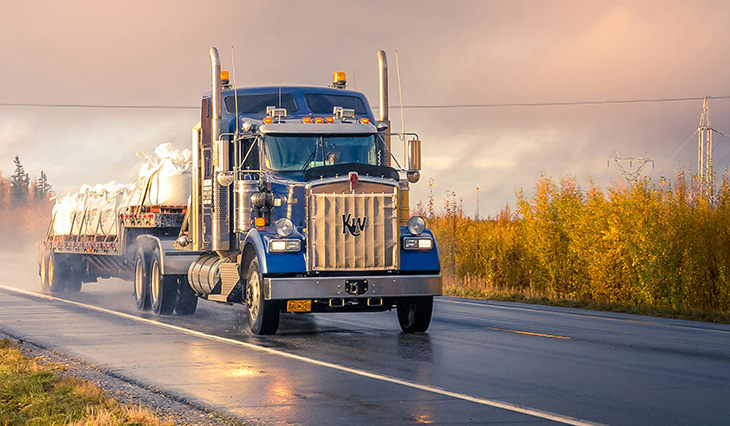Large trucks keep the economy moving here in McLean County. Even though local businesses rely on these vehicles throughout Central Illinois, we have to acknowledge that tractor-trailers can cause catastrophic injuries and property damage when accidents occur.
After a collision with an 18-wheeler, Onward Injury Law can help you recover with hope and dignity. We’ll make sure you’re not taken advantage of by insurance companies or trucking companies. We can level that playing field so you can heal with dignity and peace of mind.
Managing Attorney Josh Rohrscheib and his team are ready to help. To request a free consultation with experienced truck accident lawyers in Bloomington, IL, contact our law firm today.

How Common Are Trucking Accidents in the Bloomington Area?
Big rig crashes accounted for roughly 3.7% of all collisions in Illinois based on the latest data available.
According to data from the Illinois Department of Transportation, there were 11,980 semi-truck and tractor-trailer collisions in the state of Illinois in 2023. This included 1,957 injury crashes and 121 fatal collisions with large trucks.
According to McLean County crash data, there were 200 big rig crashes in 2023; Bloomington-specific accident data recorded 40 semi-truck crashes in the city during 2023.
Where Truck Accidents Often Occur in the Bloomington Area
Here are a few major highways in McLean County where tractor-trailer accidents are likely to happen.
- Interstate 55: I-55 connects Chicago to St. Louis, running through Bloomington and other Central Illinois cities. Heavy commercial traffic along the interstate can lead to dangerous driving conditions.
- Interstate 74: I-74 runs from Iowa through Central Illinois en route to Indianapolis and Cincinnati. Truckers may be on I-74 for long hours, increasing the dangers of driver fatigue on a busy highway.
- Interstate 39: I-39 starts in nearby Normal and heads north, running concurrently with I-90 toward Madison. There are plenty of hazards for local drivers on I-39, particularly around the I-55 interchange.
- U.S. Route 51: U.S. 51 runs all the way from New Orleans to the state line of Michigan and Wisconsin. On an average day, up to 20,000 vehicles, including large trucks, travel on U.S. 51 through Bloomington.
- U.S. Route 150: U.S. 150 runs through much of Central Illinois en route to Indiana and Kentucky. Local drivers need to be especially careful as speeds slow down within city limits but pick up in rural stretches of the highway.
Risk of Truck Collisions in Surrounding Rural Areas
We should note the added dangers to drivers on rural roads in and around McLean County. Truckers may take chances on two-lane highways in rural areas, speeding or otherwise driving recklessly. Tall crops along the highway could obscure views of traffic at intersections, and a lack of lighting at night may lead to otherwise avoidable collisions.
Drivers need to exercise additional caution when driving outside of Bloomington city limits. It can take much longer for first responders to reach people on rural roads around Central Illinois.
Common Causes of Large Truck Accidents
Here are some of the most common causes of 18-wheeler crashes in McLean County.
Truck Driver Fatigue
Truckers spend many hours on the interstate and rural highways, which can lead to exhaustion and possibly even falling asleep behind the wheel. These lapses in alertness could lead to catastrophic crashes.
Distracted Truck Drivers
Distractions refer to any actions that cause a trucker to take their hands off the wheel or divert their attention from the road. Common forms of truck driver distraction include texting or talking on the phone while driving, looking up directions, eating while driving, and rubbernecking.
Speeding and Reckless Driving
Truckers must follow traffic laws and be careful on busy roads given the sheer size of a tractor-trailer. Speeding, refusing to yield, and reckless driving can all increase the risk of a major collision.
Failure to Check Blind Spots
Tractor-trailers have massive blind spots on all sides of a vehicle. Truckers need to be especially attentive on busy highways and city streets as they turn and merge to avoid serious accidents.
Impaired Driving by Truckers
Truckers who drive under the influence of alcohol or drugs put themselves and countless others on the road at risk. Any commercial truck driver who causes a DUI accident needs to be held accountable for the harm they cause.
Truck Driver Inexperience
It takes a lot of skill and training to properly operate a semi-truck. When truckers are inexperienced, they may not know how to brake properly or account for steep inclines, which can cause major accidents.
Bad Weather and Road Conditions
Ice and snow can worsen dangerous driving conditions, leading to multi-vehicle trucking accidents. In addition, poor lighting on rural roads, lack of signs, potholes, and other road conditions make large truck accidents more likely around McLean County.
Common Types of Truck Accidents
Below are some of the most common types of accidents involving tractor-trailers.
- Jackknife Accidents: A jackknife accident is when a trailer turns in toward the cab, much like a folding knife. This is usually caused by improper braking, sharp turns, heavy cargo, and truckers overcompensating while steering.
- Underride Collisions: An underride collision occurs when another vehicle gets caught under the trailer of an 18-wheeler. These types of accidents happen when truck drivers fail to check their blind spot before making a turn or merging.
- Rollover Accidents: Semi-truck rollover accidents occur when these massive vehicles wind up on their sides. This is usually caused by sudden braking, improperly loaded cargo, and taking a sharp turn.
- Rear-End Collisions: It takes much longer for a big rig to stop than a smaller vehicle. When truckers are caught by surprise or are speeding, this can lead to catastrophic rear-end crashes.
- Wide-Turn Accidents: Tractor-trailers make wide turns. If truck drivers don’t check their blind spot while turning, they could accidentally hit a vehicle in a nearby lane.
- Lost Load Accidents: If a big rig’s cargo comes loose, it can fall and damage adjacent vehicles. Additional accidents could occur due to the debris that’s been left on the road.
- Getting Run Off the Road: A negligent trucker may cause drivers to swerve off the road in order to avoid a direct collision. Yet getting run off the road can still cause serious injuries.
State and Federal Laws Relevant to Your Trucking Accident Case
These are a few key federal and state laws that are relevant to semi-truck collisions in Central Illinois.
FMCSA Hours of Service Regulation
The Federal Motor Carrier Safety Administration (FMCSA) provides hours-of-service regulations to prevent overworking truckers and driver fatigue. If truckers ignore these driving limits, fail to log their breaks, or are encouraged to violate these regulations, they could be held liable for any injuries or property damage.
In addition to hours-of-service regulations, truckers must also abide by federal laws related to vehicle inspection and maintenance requirements, vehicle weight limits, CDL licensing rules, drug and alcohol testing, and the use of an electronic logging device (ELD).
Two-Year Statute of Limitations
In the state of Illinois, you generally have two years from the date of a semi-truck crash to file a personal injury or wrongful death claim (Illinois Compiled Statutes 735 § 5/13-202). Once the two-year statute of limitations has expired, you can no longer file a lawsuit.
There are a few exceptions to this two-year deadline that depend on the circumstances of the crash and the parties who were involved. Regardless, it’s best to speak with our Bloomington trucking accident attorneys as soon as possible.
Partial Fault/Modified Comparative Negligence
Illinois allows you to file a lawsuit as long as you are less than 50% responsible for the semi-truck crash. This is because the state follows a modified comparative negligence rule. Your compensation gets reduced by your percentage of liability.
For example, say that you receive $100,000 in damages, but you are found 20% responsible for the tractor-trailer accident. You would still receive $80,000.

Who Can Be Held Liable for a Semi-Truck Accident?
Depending on what happened during your truck accident in the Bloomington area, any of the following parties could be held responsible for the collision. Our attorneys will carefully review the evidence in your case to ensure all negligent parties are held liable.
- The Truck Driver: Short-haul and long-haul truckers can be held liable if their inexperience or negligence leads to a collision.
- The Trucking Company: Trucking companies could be liable for encouraging their drivers to violate federal laws or for negligent practices in screening and hiring.
- Repair and Maintenance Crews: Tractor-trailers need regular maintenance for safe operation. Maintenance workers could be held liable for poor repairs.
- Local Municipalities: When local road authorities in McLean County fail to repair damaged roads or prepare for winter weather conditions, they could be held liable for a large truck collision.
What Damages are Recoverable Following a Semi-Truck Accident?
Compensation for a semi-truck accident in the Bloomington area can vary based on available insurance coverage, the nature of your injuries, the number of parties involved in the crash, and other factors.
At Onward Injury Law, we’ll review the ways the trucking accident has changed your life and help you understand what your case is really worth.
Economic and Non-Economic Damages
Economic damages refer to calculable material and financial losses associated with a large truck accident. Common examples of economic damages after a collision include:
- Medical bills (past, current, and future needs)
- Physical rehabilitation and occupational therapy
- Damage to your vehicle and other belongings
- Lost wages due to medical leave
- Loss of future earning potential due to serious injury
Non-economic damages are subjective changes in your quality of life. These damages are usually more difficult to calculate because there are no precise amounts that define them. Common examples of non-economic damages in truck accident cases include:
- Pain and suffering
- Emotional distress
- Physical disfigurement or impairment
- Changes in quality of life
Damages After a Fatal Semi-Truck Accident
If you lose a loved one in a tractor-trailer accident, you have our deepest condolences. When you are ready to speak with our lawyers, we can discuss filing a wrongful death lawsuit. Compensation in fatal truck accident cases can cover funeral expenses, grief counseling, loss of companionship, and the pain associated with a tragic loss.
Punitive Damages in Trucking Accident Claims
Also known as exemplary damages, punitive damages are intended to punish the negligent party rather than compensate a family for financial and subjective losses. To be eligible for punitive damages after an 18-wheeler accident in Illinois, there must be clear and convincing evidence that the other party acted in a willful and wanton manner or caused intentional harm.
Receiving punitive damages is rare for most accident cases. The team at Onward Injury Law can let you know if you can pursue punitive damages based on the circumstances of your semi-truck accident claim.
What to Do After a Trucking Accident in the Bloomington Area
If you get into a trucking accident in Bloomington, following these crucial first steps can help you as you seek a settlement or pursue litigation.
- Check If Anyone Is Hurt: Check if you’ve been seriously injured. Check the condition of any passengers in your vehicle as well.
- Get Yourself to Safety: If you’re capable of doing so, move your vehicle out of traffic and get all vehicle occupants to safety. Set down road flares to alert other drivers of the crash site.
- Call 911: Alert law enforcement of the trucking accident and ask for an ambulance for injuries.
- Exchange Information with Others: Exchange contact information with the truck driver and any other motorists involved in the accident. Be sure to get contact info from anyone who witnessed the collision as well.
- Take Photos and Videos of the Truck Accident: Carefully document the trucking accident. Get photos and videos from multiple angles, and take pictures of the road and the surrounding area.
- Cooperate with Authorities: Provide factual statements to police officers and any emergency crews responding to the accident. This will help them file an official report, which can help with insurance claims and litigation.
- Seek Medical Attention: You may not notice injuries immediately after a tractor-trailer crash. Even if you feel fine, meet with a doctor for an examination just in case.
- Notify Your Insurance Company: Inform your insurer that you were in a collision. Don’t admit fault or offer your opinion. Just provide the facts.
- Speak with a Truck Accident Attorney: After a collision with an 18-wheeler, it’s best to contact our Bloomington trucking accident lawyers for a consultation. Onward Injury Law can help you take on insurance companies and trucking companies.

Why Choose Onward Injury Law for Your Trucking Accident Claim
There are many law firms serving truck accident survivors in Central Illinois, but Onward Injury Law offers strong and reliable representation that always puts you and your situation first.
- We Put People and Healing First: You and your family are not case numbers. We care about your recovery and long-term well-being, and will always prioritize what’s best for you.
- We Simplify Complicated Legal Topics: Truck accident litigation, insurance coverage, and federal trucking regulations are complex, but we’ll make sure you understand every aspect of your case.
- We’re Dedicated and We Give a Damn: You deserve transparency, honesty, and regular communication from us as your accident claim progresses.
- We Only Get Paid If We Win for You: We work on a contingency fee basis, meaning you don’t pay unless or until we secure a settlement or win damages in court.
Contact Our Truck Accident Attorneys in Bloomington, IL
If you were hit by an 18-wheeler in McLean County, you can rely on Onward Injury Law to guide you through your recovery. We’ll identify the best options you have for securing compensation and provide answers to any of your questions every step of the way.
To request a free consultation with our truck accident lawyers in Bloomington, IL, contact Onward Injury Law today. We’re here to help and ready to listen.
